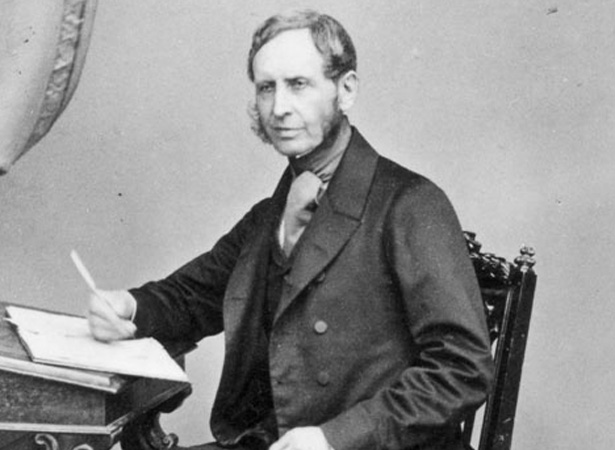
Robert FitzRoy, the second governor of New Zealand, took his own life at his home in Surrey.
Opinion on his governorship has always been divided. While the writer Steve Braunias described FitzRoy as ‘our first great wretch’, historian Ian Wards argued that his achievements were ‘considerable’ and blamed the Colonial Office for his shortcomings as governor.
A naval officer, FitzRoy took command of HMS Beagle in 1831. The observations of the naturalist Charles Darwin during its five-year voyage around the world were crucial to the development of the theory of natural selection. The Beagle visited the Bay of Islands, which Darwin described as ‘not a pleasant place’.
FitzRoy’s tenure as governor from December 1843 to November 1845 was dominated by deteriorating race relations. His failure to punish Ngāti Toa for the Wairau incident, in which 22 Nelson settlers were killed, angered colonists. FitzRoy concluded that the settlers had been largely to blame – and in any case, he lacked the resources to respond with force. With the colony virtually bankrupt and lacking troops, FitzRoy had to rely on ‘moral suasion’. He further alienated New Zealand Company settlers by suggesting – with good reason – that the company had no legitimate title to the land it claimed in the Wairau Valley.
In March 1845 the powerful Ngāpuhi chief Hōne Heke attacked the British flagstaff at Kororāreka and then sacked the town. FitzRoy’s effectiveness as governor was again questioned. By the end of the year FitzRoy had been replaced by George Grey. Nelson settlers celebrated by burning him in effigy.
FitzRoy retired from active service in 1850 and was elected to the Royal Society in 1851. In 1854 he became chief of a new meteorological department of the Board of Trade. He instituted a system of storm warnings and published the first regular daily weather reports and forecasts.
By 1865 FitzRoy was in financial difficulties, physically and mentally exhausted, and suffering from depression. On Sunday 30 April he rose from his bed, bolted the door to his dressing room and slit his throat with a razor.
Read more on NZHistory
Robert FitzRoyGovernors and governors-general – Governors and Governors-General
External links
How to cite this page
'Former Governor FitzRoy dies by suicide', URL: https://nzhistory.govt.nz/page/former-governor-fitzroy-dies-suicide, (Ministry for Culture and Heritage), updated 28-Nov-2022
